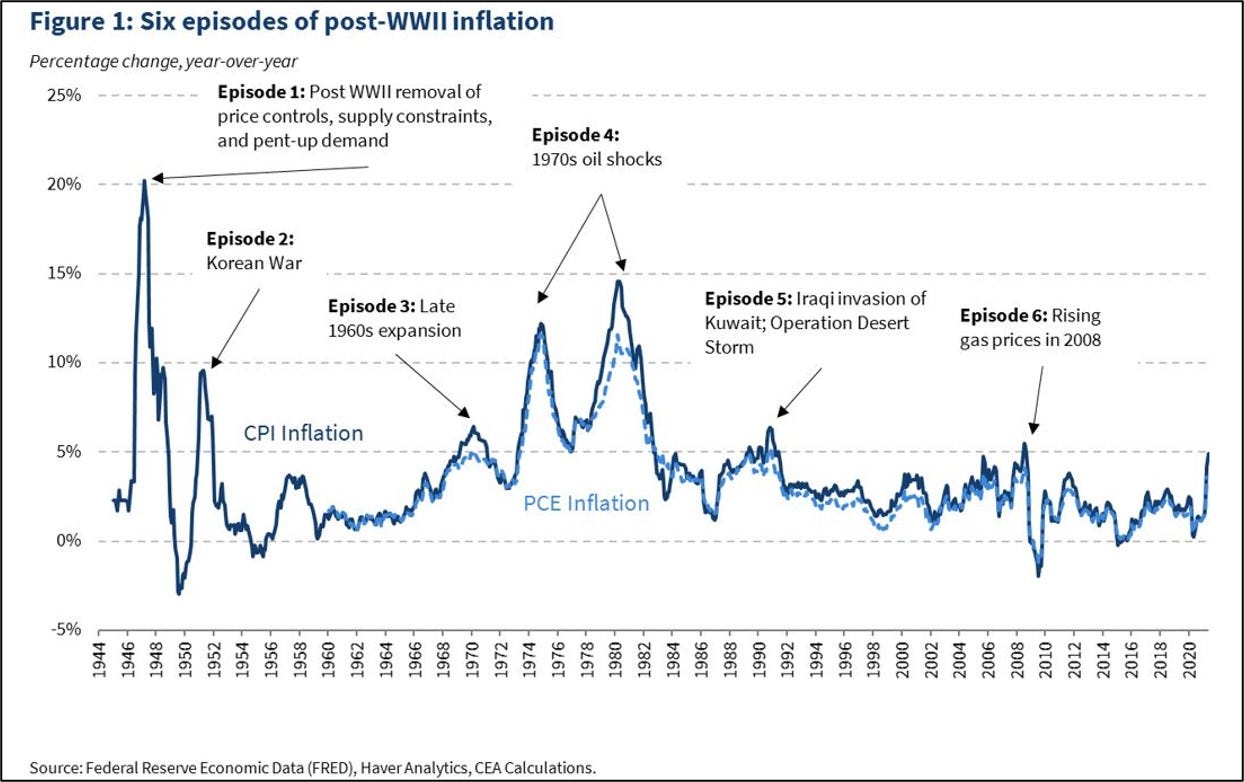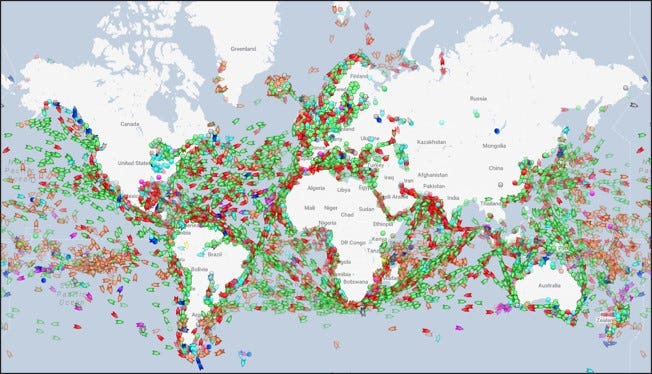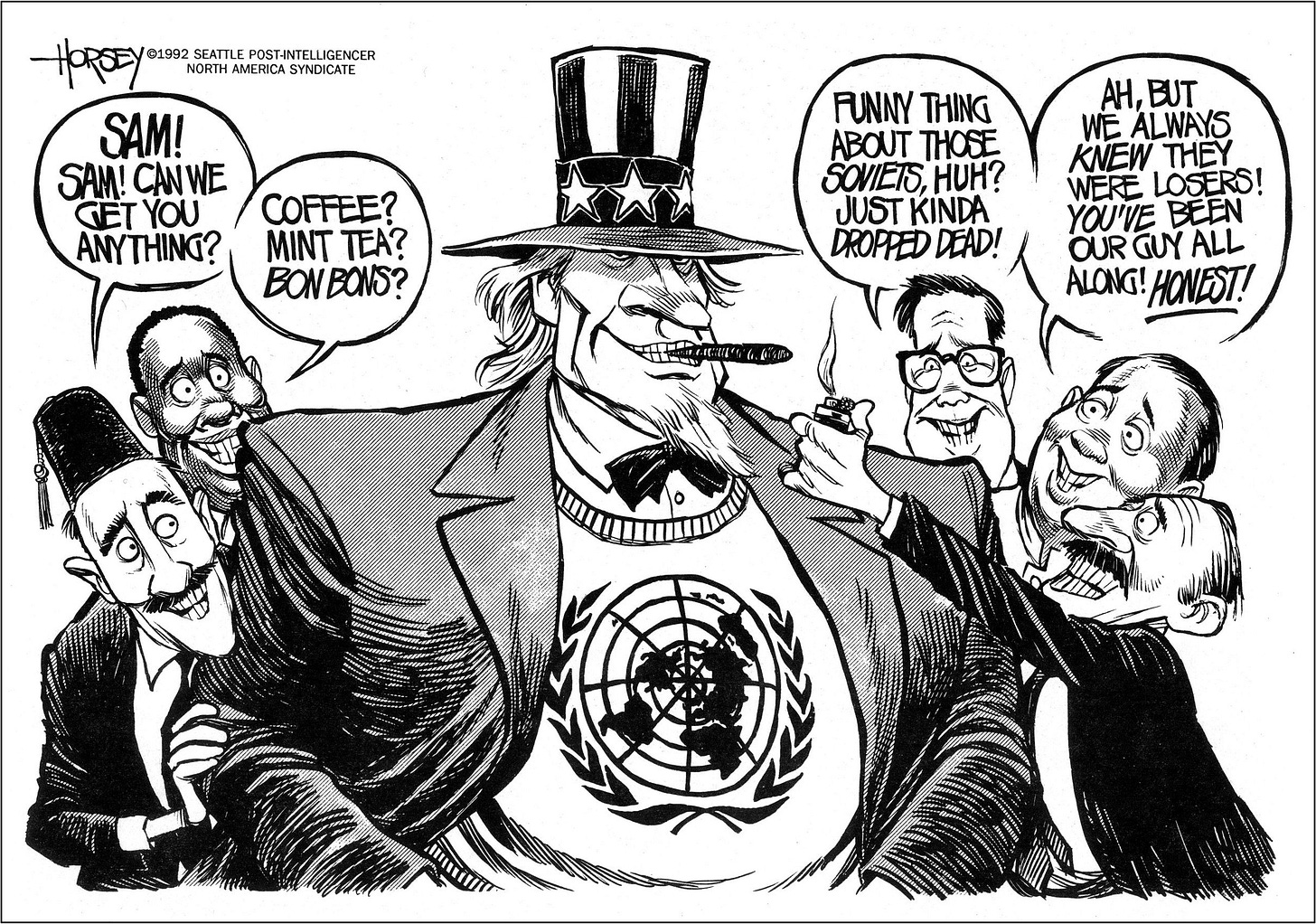As the Global Policeman Retrenches...
the Plug #29 | On American Hegemony & Western Energy Policy
“The world since 1946 is as calm as the world has ever been.” – Peter Zeihan
"If something cannot go on forever, it will stop." – Herbert Stein
For the people of Ukraine, it has now been seven long weeks since Vladimir Putin decided that the time was right to launch a full-scale invasion of its former Soviet compatriot.
Throughout that time, my shock and disbelief stemming from the conflict’s evolution have continued to hit new highs. In part, because Russia’s recent belligerence is the first outbreak of war on the European continent in over 70 years.
The totality of the destruction in the Ukrainian city of Mariupol (highlighted in the video below) was jaw-dropping. More recently, as footage emerged out of the Northern Ukrainian town of Bucha showing Ukrainian citizens that had been shot execution-style, my shock continued to mount. And, more recently, the emergence of unconfirmed reports that chemical weapons were used by Russian forces is equally disheartening.
Yesterday, President Biden come out and described Russia’s invasion as a genocide. Increasingly, that attribution seems to be a fitting summation of Russian intention.
In the face of mountain Russian atrocities, what I've found most baffling is the degree to which the Russian invasion was unforeseen by European and North American pundits and policymakers. Particularly when considering the ramifications for energy and agricultural markets globally; two of the most critical global industries for human wellbeing and economic growth.
How did so many people, including myself, fail entirely to see this coming?
Even more dumbfounding to me is how European policymakers failed to establish contingency plans to counter Russian aggression. Most specifically, by failing to diversify their supply of oil, natural gas, and coal supplies.
I'm speaking specifically to you, Germany.
In my search for answers, I recently stumbled upon the work of two insightful and incredibly entertaining geopolitical strategists: Peter Zeihan and Marco Papic. Their overarching theses for the coming trajectory of human wellbeing, political direction, and international trade bear many notable similarities.
Spoiler: it’s not great, Bob!
Their writing has also helped to highlight a blind spot of mine.
Throughout my first twenty-six years of life, I have grown increasingly accustomed to the global dominance asserted by the United States. America’s global strategic influence – wielded militaristically, politically, and economically – has become a central fixture in my worldview.
But I have now realized that this assumption needs further diligence.
My main takeaway thus far from Papic and Zeihan is that the 2020s will bear little similarities to the 1990s, the 2000s, and the 2010s. That is because, for the past three decades, the world has been (with notable exceptions) largely peaceful and orderly.

But, what will happen to the continued state of global peace and order if the United States continues along its path of retrenchment from global affairs?
The devastation wrought by Russian forces is incredibly tragic. Sadly, I believe that it is also a symptom of a larger overarching global trend: the retrenchment of the United States from the global stage.
If Zeihan and Papic are correct (which I believe they are), the impending reversal towards the mean of violence doesn’t bode well for human flourishing. The impact will be felt in energy, agriculture, international cooperation, globalization, and pretty much every aspect of our lives.
The multi-decade-long American global security guarantee has served as an anti-frictional force; greasing the skids of the global economy. But America’s role in maintaining global order seems to be quickly becoming a relic of the past.
As US foreign policy turns increasingly inwardly, the void left behind by the retirement of the global policeman will be felt by all of the world’s citizens. The longer-term implications and second-order effects of America’s diminished role internationally will reverberate through every corner of the world for years, if not decades, to come.
Sadly, I will not be surprised if the ongoing conflict in Ukraine is not the only conflict that takes the world by surprise during this coming decade.
🔨 The Falling of a Symbolic Wall
One night in November 1989, the world was taken by surprise when German citizens began tearing down the Berlin Wall.
The event was particularly notable given that the wall was a symbol of the Cold War rivalry and bi-polar global cooperation between the United States and the now-former Soviet Union.
That event marked the beginning of the Soviet Union’s end.
By October 1990, East and West Germany were reunified. Thirteen months later, in December 1991, Soviet General Secretary Mikhail Gorbachev resigned and the Soviet Union was dissolved.
Game over for the hammer and sickle.
The dissolution of the Soviet Union left the world with only one superpower: the United States. In the proceeding three decades, human progress globally has been nothing short of remarkable.
Vaccination rates have gone up. Child mortality rates have gone down. Literacy has improved. Conflict has declined. Democracy has spread. Autocracy has faltered.
Need I say more?

That global progress was largely due to the role assumed by the US as it waged cold war against its communist rival.
To counteract Soviet influence, the United States strove to bolster its position as the most powerful empire in human history. American policymakers also realized the obvious: that to most effectively combat the Soviets, the US couldn’t go at it alone.
So, the US formed alliances, including the North Atlantic Treaty Organization (NATO). It also established a globally interconnected financial system through the formation of Bretton Woods. And, maybe most importantly, it asserted itself as the global policeman of the seas.
In the words of Peter Zeihan (emphasis added):
“The Americans pledged total physical security for anyone who joined their alliance, protecting them with tanks, troops, ships, and the still-under-development nuclear umbrella. The Americans used their absolute mastery of the seas to protect any ship from anywhere transporting any product to any location.”
In the past half-century, supported by the American’s global security guarantee, the globalization of trade took root. And, slowly, it produced the global economy that we now take for granted.
Since the collapse of the former Soviet Union, the unipolar hegemony of the United States broke down international barriers to trade; specifically, by dissolving the physical boundaries that separate countries.
I am increasingly cognizant that the American security complex, depicted below, is largely to thank for the peace and prosperity I have experienced throughout my entire life.

American security facilitated global economies of scale, whereby labor inputs shifted towards the lowest-cost provider. It enabled steady and reliable access to energy and agriculture commodities from worlds away, via cross-border supply chains and international trade.
The role played by the American Navy in facilitating globalization and international "free" trade should not be understated.
That is because American security enabled globalization.
America’s role in global affairs also facilitated a deflationary tailwind which I have been witness to throughout my life. American security facilitated an operating environment where unprecedented economies of scale and continuity of global order were made possible.
Same-day package deliveries, exceptionally fast internet speeds, a robust and consumer-friendly energy system, and plentiful access to inexpensive food are but a few of the many examples of this phenomenon.
The impact of America’s global involvement over the past half-century has been structurally deflationary.

Unfortunately, the beneficiaries of the United States’ role as the global security provider have disproportionately been non-Americans. In the Soviet Union’s absence, the driving force behind American foreign policy no longer exists.
It seems that the Americans are increasingly of the belief that in the context of international trade, the US has gotten the short end of the globalization stick.
With the original intention of America’s foreign policy having been fulfilled back in the early 1990s, it should come as no surprise that the American attitude towards global engagement should change accordingly.
And change it (eventually) will!
🏛️ What About Energy Policy?
You may be wondering, what does any of this have to do with energy?
In fact, I believe that the deterioration of America's long-standing presence as a global security provider has everything to do with energy. This is because the delicate supply-demand balances for the litany of energy-related commodities necessary to run a modern-day economy are incredibly reliant on the stability of global shipping channels.
A lack of American maritime security will make it increasingly precarious for the world to secure energy supplies.

In light of the Ukraine crisis, I believe we will continue to see a shift in Western energy policy.
Over the past five years, the energy policy pendulum in North America and Europe has swung hard in the direction of decarbonization. Unquestionably, the threat of climate change continues to worsen with each incremental ton of emissions. But decarbonizing our energy system is only one of the many challenges competing for policymaker attention.
As Russian troops press on in Ukraine, energy security is back on the menu.
More broadly, I believe that as the global policeman turns its back on the rest of the world, energy security will continue to mount as a pressing concern for the global voter base. And, as energy security increasingly gets called into question, so too will the affordability of energy supply.
This coming decade, it seems inevitable that energy-related commodity prices - including fossil fuels, base metals, and precious metals - are going to become more expensive, and increasingly volatile. In response, as the inflationary rubber hits the climate change conscious road, I expect that decarbonization fandom will begin to ween as concerns for energy and food security take priority.
All that to say, it's going to be an interesting decade. And one which I expect will bear few geopolitical similarities to the past 30 years.
Best prepare accordingly!
📚 Recommended Reading
Separately, I’d highly encourage you to check out the two books which have helped to inform my go-forward worldview:






Powerful piece Adam, well written. I wonder what the following 20 or 30 years would look like if the trend plays out in reverse: falling security leading to trade friction, depressing economic growth. Are we in uncharted territory?
Loved reading this. As someone who was born in India, and is currently citizen of both France and US - I couldn't agree more. For folks who enjoy blaming the US for all the world's malaise, I bet they will miss the peace and prosperity that America created around the world after WW II. Hopefully it doesn't take more wars to see reason. Well written Adam!